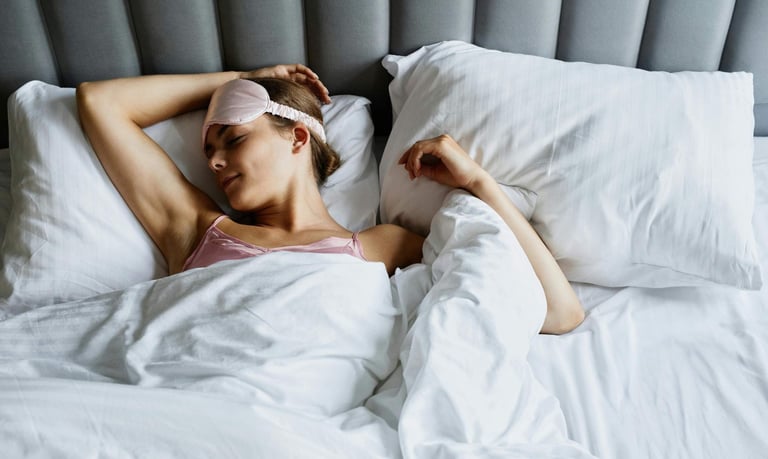CEO Sleep Habits: Biohacks for a Sharper Mind and Youthful Body
HEALTH & WELLNESSFEATUREDWELL-BEING


True leaders know that sharper decision-making, emotional resilience, and even youthful vitality aren’t fueled by espresso shots but powered by quality sleep. In the real boardroom, those who snooze win
In a world that worships hustle culture, it turns out the real moguls are prioritizing something far more potent than another late-night email: sleep. According to the Expert Reviews Sleep Survey, 77% of CEOs reported getting enough sleep each night. Rest, it seems, is less about indulgence and more about strategy at the top. True leaders know that sharper decision-making, emotional resilience, and even youthful vitality aren’t fueled by espresso shots but powered by quality sleep. In the real boardroom, those who snooze win.
After all, sleep is where the real regeneration happens: your skin repairs itself, your brain clears out toxic waste, and your metabolism recalibrates. Neglecting sleep can show up faster than you think - as deeper lines, stubborn belly fat, or that familiar “word on the tip of your tongue” moment. As sleep scientist Matthew Walker, Ph.D., writes in his bestseller Why We Sleep, “Sleep is the single most effective thing we can do to reset our brain and body health each day.” It's time we treated it that way.
The science behind restorative sleep
Sleep isn’t just one long nap - it’s a carefully choreographed sequence of stages that serve different functions. There’s light sleep, where the body slows down and the muscles relax; deep sleep, where cellular repair and growth hormone release occur; and REM sleep, the vivid dream stage that boosts learning, creativity, and problem-solving.
But here’s the kicker: as we age, these sleep stages become harder to maintain. As studies have found, melatonin production decreases with age, and so does the time spent in deep sleep. This leads to more frequent waking and a harder time falling back asleep, especially for adults over 40.
Worse yet, unstable sleep patterns are linked to accelerated aging. Studies have found a positive correlation between consistent sleep-wake cycles and improved longevity among older adults. And chronic sleep deprivation? It’s been shown to affect one’s cardiovascular, respiratory, and immune health, among others. Sleep deprivation can take its toll on your mental health too. So yes, beauty sleep is real, and it’s backed by science.
Biohacks for a better sleep
If you’re over 40, getting truly restorative sleep requires more than just going to bed on time. It means working with your biology (not against it) by adjusting your environment, evening habits, and even supplements. From light exposure to room temperature and smart tech, small shifts can lead to dramatically deeper, more rejuvenating rest. Think of these tools as strategic upgrades, not strict rules. Each one is designed to help you wake up with better focus, steadier energy, and a body that feels just a little bit younger.
Circadian Rhythm Alignment
Your body has a built-in clock, and aligning with it can make all the difference. Exposing yourself to natural light within 30 minutes of waking helps regulate your internal rhythm and boosts cortisol, the hormone that fuels daytime energy. In the evening, minimizing blue light from screens supports melatonin production, the hormone that primes your body for sleep.
Temperature Optimization
Sleep researchers have long known that our core body temperature drops at night to initiate sleep. The ideal bedroom temperature? Between 60°F to 67°F (15.5°C to 19.4°C), though some may prefer up to 77°F (25°C) for comfort.
One study found that higher temperatures significantly worsened sleep quality. Try cooling mattress pads like ChiliSleep or Eight Sleep, which regulate body temperature throughout the night and can help you stay in deeper sleep stages longer.
Smart Sleep Tracking
Knowledge is power, and wearable trackers like the Oura Ring or WHOOP provide insights into your sleep stages, heart rate variability (HRV), and recovery patterns. HRV, in particular, is a strong indicator of nervous system balance and resilience.
But don’t just check your sleep score. Use the data to identify patterns. For instance, discover how alcohol or late workouts affect your REM, or how a magnesium supplement might deepen your slow-wave sleep. Then adjust your habits accordingly for more restorative sleep night after night.
Magnesium
Magnesium is a powerhouse mineral that calms the nervous system and supports neurotransmitter function. Studies have shown that magnesium intake is strongly linked to better sleep quality and duration.
Soundscaping and binaural beats
Forget white noise. Binaural beats, soundscapes that play slightly different frequencies in each ear, have been shown to improve sleep quality and even deepen certain sleep stages. A study found that delta-frequency (3 Hz) binaural beats increased the duration restorative slow-wave sleep. Try a 30-minute track with headphones as you wind down, or use apps like Brain.fm or SleepSpace.
Biohack your night routine: the CEO wind-down
Luxury isn’t just a spa day—it’s how you treat your evening. The secret to deeper sleep in your 40s, 50s, and beyond might just be a ritual that feels like self-care but works like science.
Start with a soothing herbal tea featuring lemon balm (Melissa officinalis) or valerian root. A double-blind study found that lemon balm significantly improved sleep quality, while a systematic review confirmed valerian’s effectiveness in reducing sleep latency. For a perfect sleep tea:
Ingredients:
1 tsp dried lemon balm leaves (or 1 tea bag)
250 ml (1 cup) hot water
1 tsp raw honey (optional)
A squeeze of fresh lemon
Instructions:
Steep the lemon balm in hot water (just off boil) for 5–7 minutes.
Add honey and lemon if desired.
Sip slowly, ideally an hour before bed.
Next, soak in an Epsom salt bath. Add 2 cups (473 g) of magnesium sulfate to warm bathwater and soak for at least 20 minutes. Magnesium can relaxation, soothe muscles, and support natural melatonin release. Finally, close the day with five minutes of journaling. A simple gratitude log ( for instance, just three things you're thankful for) can shift the nervous system out of fight-or-flight mode and into deep rest.
Sleep is the new status symbol
Let’s be honest, there’s nothing glamorous about brain fog, puffy eyes, or snapping at your partner because you’re overtired. Prioritizing restorative sleep isn’t indulgent. It’s essential. The science is clear: consistent, deep, high-quality sleep is the closest thing we have to a daily reset for body and mind.
So tonight, ditch the doom-scrolling, light that candle, sip your tea, and slip into the kind of sleep that CEOs, scientists, and wellness insiders swear by. Reclaim your nights to rise stronger every day.
Disclaimer: The information provided in this article is for general wellness and educational purposes. Results may vary based on individual health needs, and we recommend consulting with a healthcare provider or wellness professional before making any changes to your routine. This article may contain affiliate links, meaning we may earn a small commission if you make a purchase through them. Always consult with a doctor or health expert before implementing any new health or wellness practices.
Lemon Balm Sleep Tea
Serves 1
